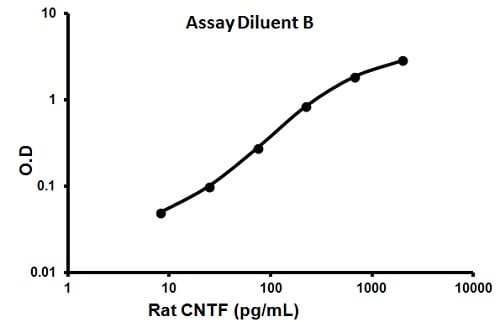Rat CNTF ELISA Kit (ab100758)
Key features and details
- Sensitivity: 10 pg/ml
- Range: 8.23 pg/ml - 2000 pg/ml
- Sample type: Cell culture supernatant, Plasma, Serum
- Detection method: Colorimetric
- Assay type: Sandwich (quantitative)
- Reacts with: Rat
Overview
-
Product name
Rat CNTF ELISA Kit
See all CNTF kits -
Detection method
Colorimetric -
Sample type
Cell culture supernatant, Serum, Plasma -
Assay type
Sandwich (quantitative) -
Sensitivity
Range
8.23 pg/ml - 2000 pg/mlRecovery
100 %
Sample specific recovery Sample type Average % Range Cell culture supernatant 97.3 89% - 108% Serum 105.6 93% - 112% Plasma 104.2 92% - 110% Assay duration
Multiple steps standard assaySpecies reactivity
Reacts with: RatProduct overview
Abcam’s CNTF Rat ELISA (Enzyme-Linked Immunosorbent Assay) kit is an in vitro enzyme-linked immunosorbent assay for the quantitative measurement of rat CNTF in serum, plasma and cell culture supernatants.
This assay employs an antibody specific for rat CNTF coated on a 96-well plate. Standards and samples are pipetted into the wells and CNTF present in a sample is bound to the wells by the immobilized antibody. The wells are washed and biotinylated anti-rat CNTF antibody is added. After washing away unbound biotinylated antibody, HRP-conjugated streptavidin is pipetted to the wells. The wells are again washed, a TMB substrate solution is added to the wells and color develops in proportion to the amount of CNTF bound. The Stop Solution changes the color from blue to yellow, and the intensity of the color is measured at 450 nm.
Platform
MicroplateProperties
-
Storage instructions
Store at -20°C. Please refer to protocols. -
Components 1 x 96 tests 200X HRP-Streptavidin Concentrate 1 x 200µl 20X Wash Buffer Concentrate 1 x 25ml 5X Assay Diluent B 1 x 15ml Assay Diluent A 1 x 30ml Biotinylated anti-rat CNTF 2 vials CNTF Microplate (12 strips x 8 wells) 1 unit Recombinant rat CNTF Standard (lyophilized) 2 vials Stop Solution 1 x 8ml TMB One-Step Substrate Reagent 1 x 12ml -
Research areas
-
Relevance
Ciliary neurotrophic factor (CNTF) is expressed in glial cells within the central and peripheral nervous systems. CNTF stimulates gene expression, cell survival or differentiation in a variety of neuronal cell types such as sensory, sympathetic, ciliary and motor neurons. CNTF itself lacks a classical signal peptide sequence of a secreted protein, but is thought to convey its cytoprotective effects after release from adult glial cells by some mechanism induced by injury. In addition to its neuronal actions, CNTF also acts on non neuronal cells such as glia, hepatocytes, skeletal muscle, embryonic stem cells and bone marrow stromal cells. -
Cellular localization
Cytoplasmic -
Alternative names
- AI429687
- Ciliary Neurotrophic Factor
- HCNTF
see all -
Database links
- Entrez Gene: 25707 Rat
- SwissProt: P20294 Rat
Properties
-
Storage instructions
Store at -20°C. Please refer to protocols. -
Components 1 x 96 tests 200X HRP-Streptavidin Concentrate 1 x 200µl 20X Wash Buffer Concentrate 1 x 25ml 5X Assay Diluent B 1 x 15ml Assay Diluent A 1 x 30ml Biotinylated anti-rat CNTF 2 vials CNTF Microplate (12 strips x 8 wells) 1 unit Recombinant rat CNTF Standard (lyophilized) 2 vials Stop Solution 1 x 8ml TMB One-Step Substrate Reagent 1 x 12ml -
Research areas
-
Relevance
Ciliary neurotrophic factor (CNTF) is expressed in glial cells within the central and peripheral nervous systems. CNTF stimulates gene expression, cell survival or differentiation in a variety of neuronal cell types such as sensory, sympathetic, ciliary and motor neurons. CNTF itself lacks a classical signal peptide sequence of a secreted protein, but is thought to convey its cytoprotective effects after release from adult glial cells by some mechanism induced by injury. In addition to its neuronal actions, CNTF also acts on non neuronal cells such as glia, hepatocytes, skeletal muscle, embryonic stem cells and bone marrow stromal cells. -
Cellular localization
Cytoplasmic -
Alternative names
- AI429687
- Ciliary Neurotrophic Factor
- HCNTF
see all -
Database links
- Entrez Gene: 25707 Rat
- SwissProt: P20294 Rat





